Key takeaways:
- Reparations politics is a multifaceted issue, highlighting the need for recognition and validation of historical grievances to foster societal healing.
- Global examples, such as Germany’s reparations post-Holocaust and South Africa’s Truth and Reconciliation Commission, emphasize the importance of acknowledgment in healing past wounds.
- Arguments for reparations include moral imperatives, potential economic benefits through investments, and psychological healing, while critiques often focus on accountability complexities and the potential diversion from systemic inequality solutions.
- The future of reparations movements requires adaptation, emphasizing education, community investment, and leveraging technology for broader advocacy.

Understanding reparations politics
Reparations politics is a complex and often polarizing topic, rooted deeply in historical injustices. I recall a conversation with an activist who passionately described the ongoing struggle for reparative justice. It made me wonder: how can society move forward without acknowledging its past?
As I delve into this issue, I often think about the emotions tied to the concept of reparations. For many, it isn’t just about financial compensation; it’s about recognition and validation of their pain. Have you ever felt that someone overlooked your struggles? That’s what many communities grapple with regarding their historical grievances.
The landscape of reparations politics varies across the globe. In places like the United States, discussions often center around slavery, while other countries focus on colonialism or war crimes. This divergence raises a critical question: how can different societies find a common ground in addressing diverse injustices? It reminds us that awareness and understanding must precede any actionable solutions in this ongoing dialogue.
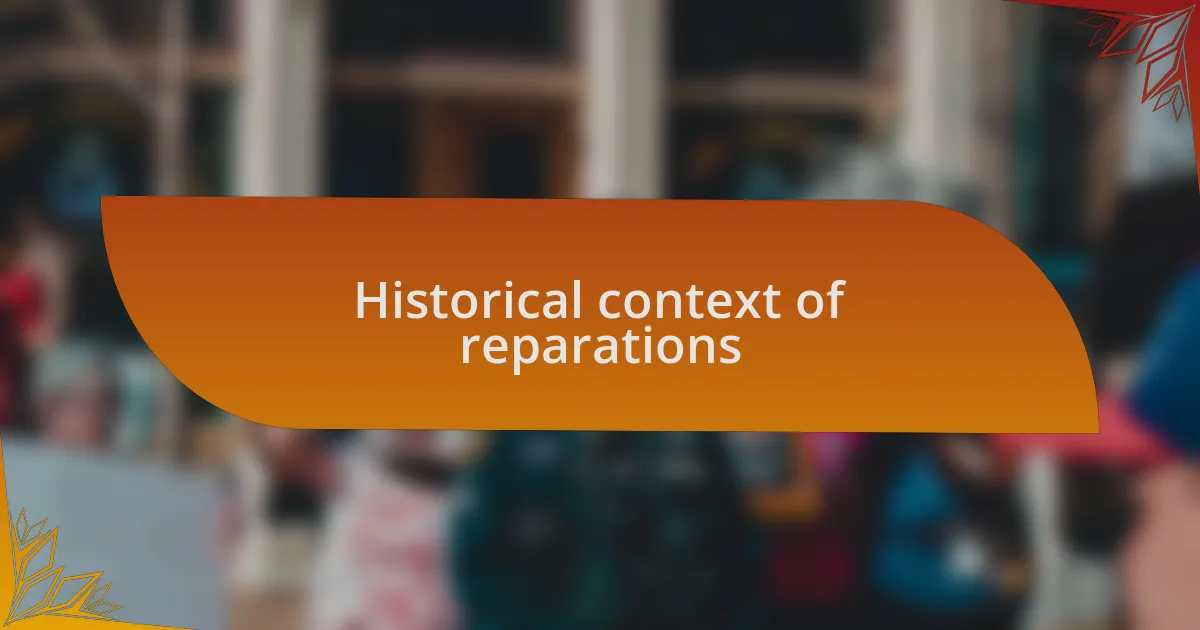
Historical context of reparations
The historical context of reparations is vast and varies significantly across different regions. In the aftermath of World War II, for example, Germany made reparations to Israel and Jewish survivors, acknowledging the horrific impact of the Holocaust. This act of acknowledgment resonates deeply with me; it highlights how concrete steps can help mend the wounds of history, even if partially.
When I think about the legacy of colonialism, I often reflect on the struggles of countries in Africa and the Caribbean that are still grappling with the economic and social scars left behind. Take Jamaica, for instance, where discussions about reparations from Britain are fraught with both hope and frustration. Is it frustrating to feel that justice is long overdue? Many share this sentiment as communities demand recognition of their historical suffering.
In more recent times, movements calling for reparations have gained momentum, sparking conversations in academia, politics, and activist circles alike. This is palpable in the United States, where debates surrounding the reparations for enslaved African Americans have come to the forefront. I often wonder, what would a truly just resolution look like? These dialogues are essential, as they may pave the way for healing and ultimately foster a society that acknowledges its troubled past while striving for a more equitable future.
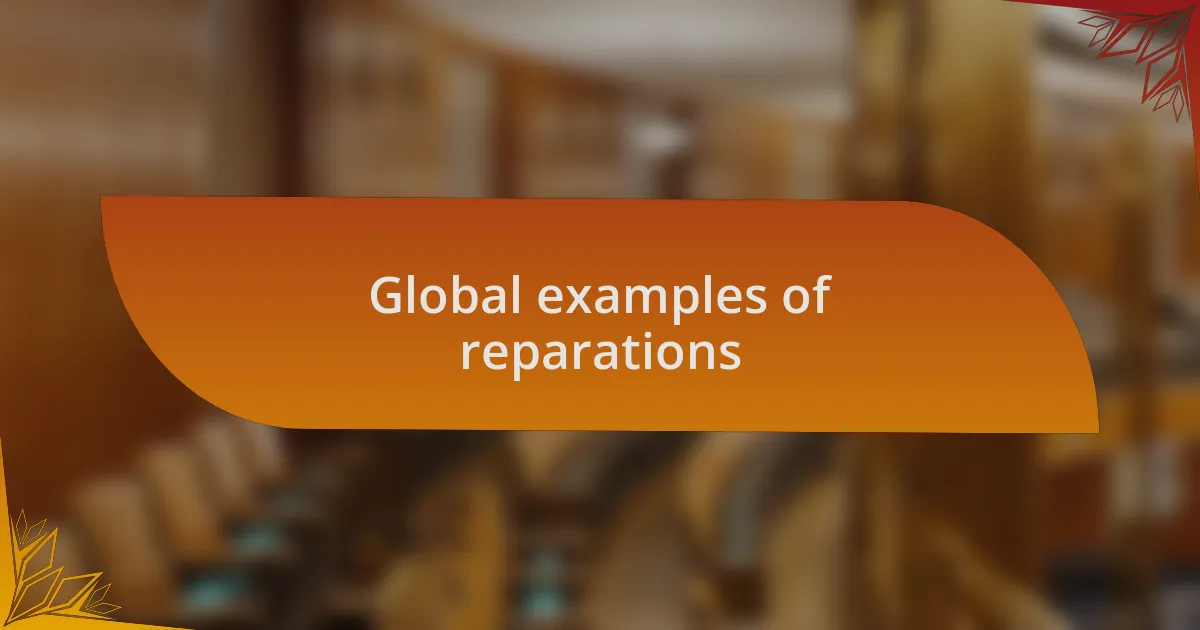
Global examples of reparations
When I look at the various examples of reparations globally, I can’t help but think of the landmark case in South Africa post-apartheid. The Truth and Reconciliation Commission (TRC) not only addressed the injustices of the past but also recommended reparations for victims of state violence. It really struck me how the process encouraged dialogue and healing, fostering a sense of unity in a society still grappling with painful memories.
Another compelling instance of reparations comes from the Netherlands, where the government has begun addressing its colonial past in Indonesia. I find it fascinating that, after decades of silence, some officials are now openly acknowledging historical injustices and discussing reparations. This shift reminds me of the importance of recognition; it’s not simply about financial compensation but also about restoring dignity and validating experiences.
In Japan, I was moved by the story of the “comfort women”—women who were forced into sexual slavery during World War II. While the government has issued apologies, the reparations remain deeply contentious and inadequate. It makes me ponder: how can we truly heal historical wounds if the efforts to restore justice are perceived as half-hearted? These global examples reveal that while the paths to reparations are complex, they are also essential in moving toward a more just and reconciled society.
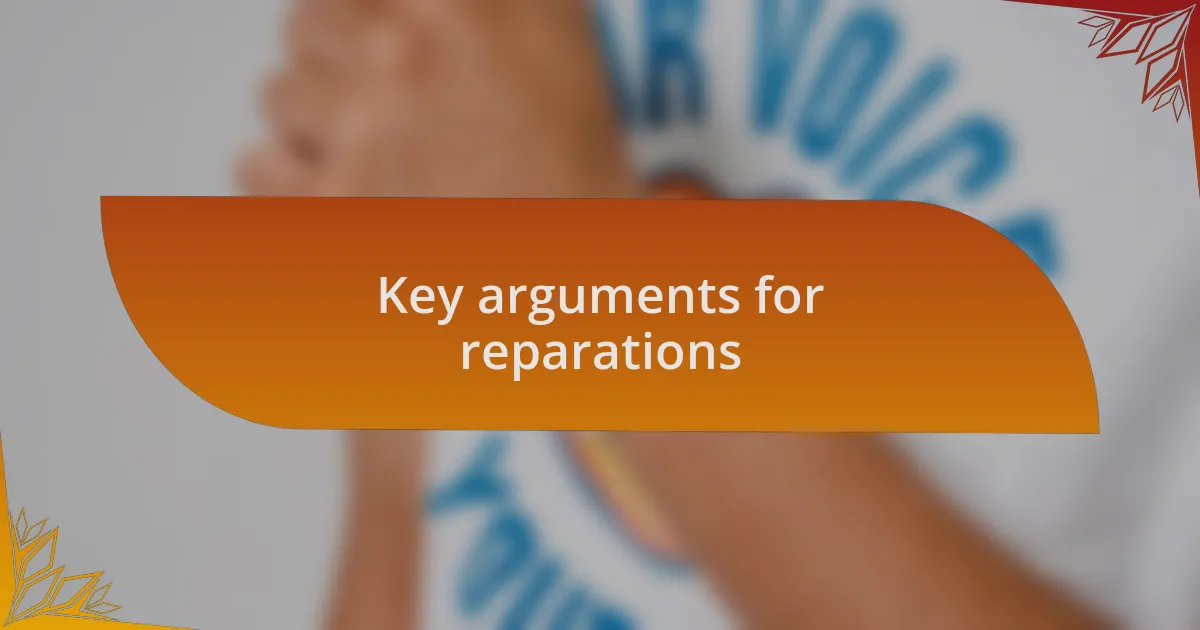
Key arguments for reparations
When discussing key arguments for reparations, one cannot overlook the moral imperative that underlies this issue. I often reflect on the basic principle of justice: if harm is done, a form of restitution is warranted. This notion resonates deeply with me, as I believe it speaks to our collective responsibility to acknowledge and rectify past wrongs, validating the pain and suffering endured by marginalized communities.
Another crucial argument centers on the economic benefits of reparations. I recall reading about how investments directed toward reparations could stimulate local economies, particularly in historically underserved areas. It’s clear to me that by providing resources for education, healthcare, and business development, societies could not only heal old wounds but also empower communities to thrive, ultimately benefiting everyone in the long run.
I also find it compelling to consider the psychological aspect of reparations. Think for a moment about the power of acknowledgment and validation; how often do we see healing begin when someone’s pain is recognized? Reparations can serve as a tangible gesture of recognition, helping individuals and communities to confront their trauma, fostering a sense of closure. How can we move forward as a society if we fail to acknowledge the weight of our history? This action is vital for fostering trust and repairing relationships, paving the way for a more inclusive future.
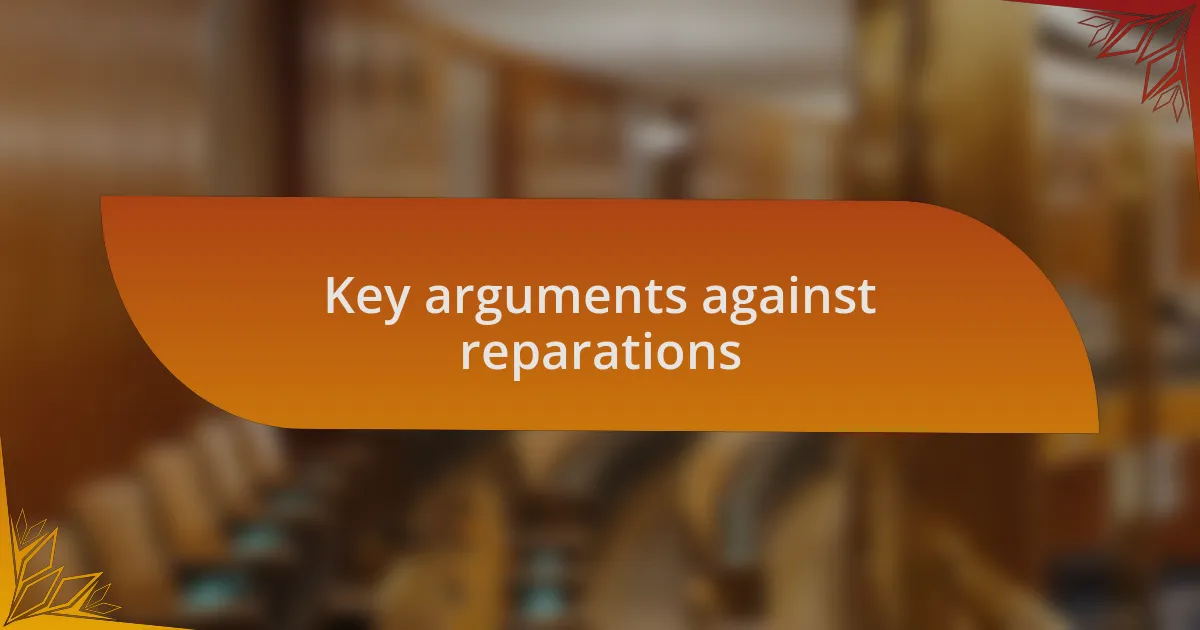
Key arguments against reparations
One of the most prevalent arguments against reparations is the complexity of accountability. When I consider this issue, I often wonder: how do we determine who is responsible for historical wrongs? Many argue that contemporary individuals should not bear the financial burden of actions taken by their ancestors, raising questions about fairness and generational guilt. This perspective often leads to a view that reparations could create division rather than unity in society.
Another argument suggests that reparations may not address the root causes of inequality. I think back to discussions I’ve had about how simply providing monetary compensation does not necessarily dismantle systemic barriers that persist today. There’s a concern that focusing on reparations could divert attention from pressing issues like education and economic policy reform, which might be more effective in achieving long-term change. Why invest in reparations when we could channel those resources into creating opportunities for all?
Additionally, some critics express skepticism about the feasibility of implementing reparations. In my experience, the logistics of determining who qualifies and how much they should receive can seem overwhelming. It raises a fundamental question: can we realistically navigate this complex landscape without alienating those on both sides of the argument? The challenge lies not only in the emotional nuances but also in the practical considerations of carrying out a reparative framework that is both just and equitable.
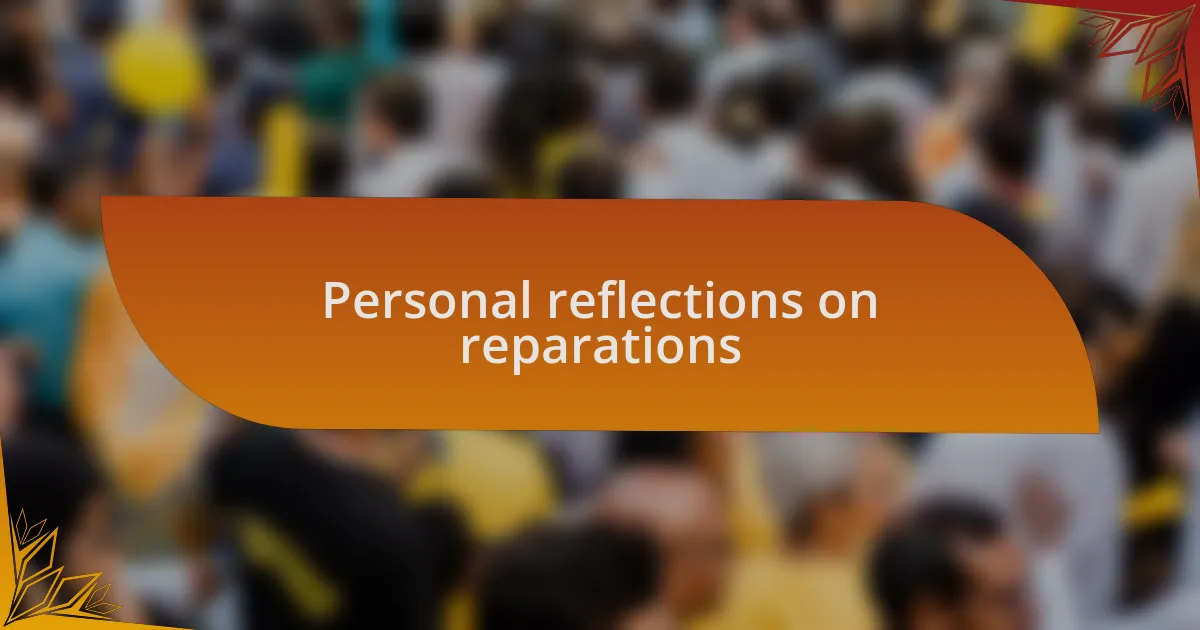
Personal reflections on reparations
Reparations, to me, seem like both a chance at healing and a challenge filled with complexities. I recall a moment during a community discussion when someone shared their family’s story of loss and resilience. It struck me deeply, highlighting that reparations are not just about money; they involve acknowledging pain and fostering understanding. Isn’t it vital that we listen to those narratives to truly grasp the impact of historical injustices?
In reflecting on this, I find myself grappling with the notion of collective memory and responsibility. There have been times when I’ve felt a mix of sympathy and frustration towards those who argue against reparations. I wonder, can we ever move forward without addressing the past? Recognizing historical grievances can open up pathways to real dialogue and truth-telling, right?
I also think about the idea of reparations as a broader framework for societal change. At one community event, we discussed not just compensation, but also restorative justice initiatives aimed at empowering disenfranchised communities. It made me realize that reparations could serve as a catalyst for transformation beyond financial remedies. Is it possible that learning from our history could not only benefit those directly affected but also enrich society as a whole?
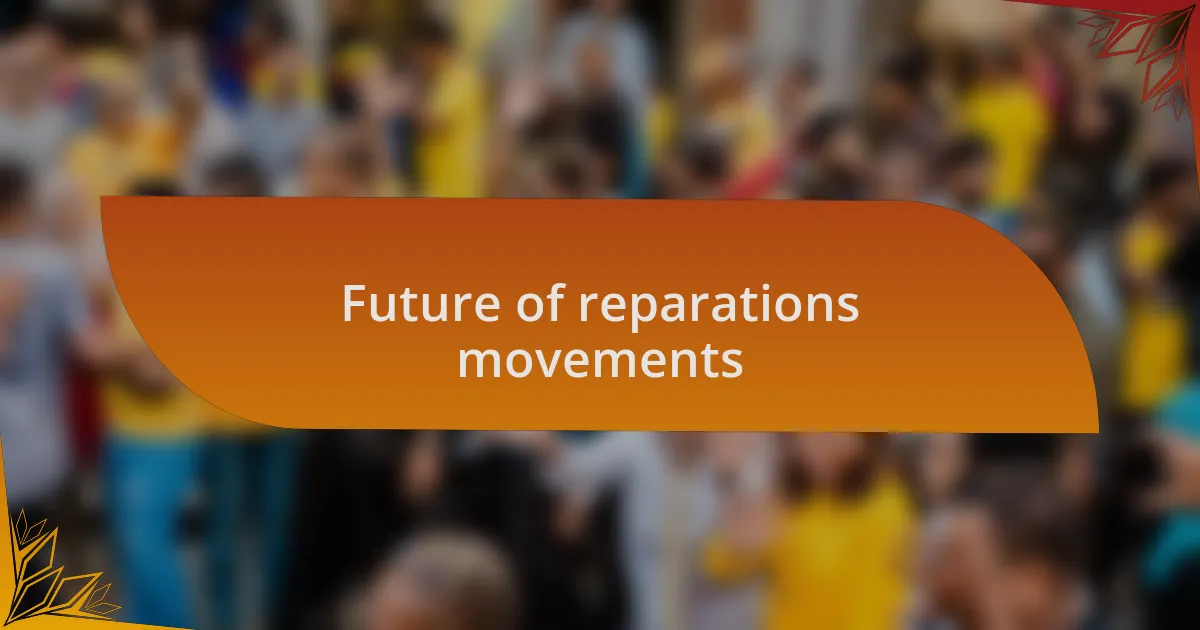
Future of reparations movements
As I think about the future of reparations movements, it’s clear that they must evolve to reflect the diverse needs of communities impacted by historical injustices. During a recent seminar, I heard activists discuss how technology could amplify calls for reparations, connecting voices globally and fostering collaboration. Isn’t it fascinating how social media can turn local stories of struggle into a worldwide movement for justice?
I also feel strongly that the dialogue around reparations must include education and awareness. While attending a workshop, a participant shared how vital it is to teach younger generations about these issues, ensuring that the lessons from our past are not forgotten. Could this educational push empower new advocates who will carry the torch forward?
Moreover, the idea of reparations shouldn’t just focus on financial compensation; it should encompass broader societal shifts, like policy reforms and community investment. I remember discussing this with a friend who works in local government, where we explored how reparations could reshape neighborhood resources. What if we viewed these movements as opportunities for systemic change that could create a more equitable society for all?